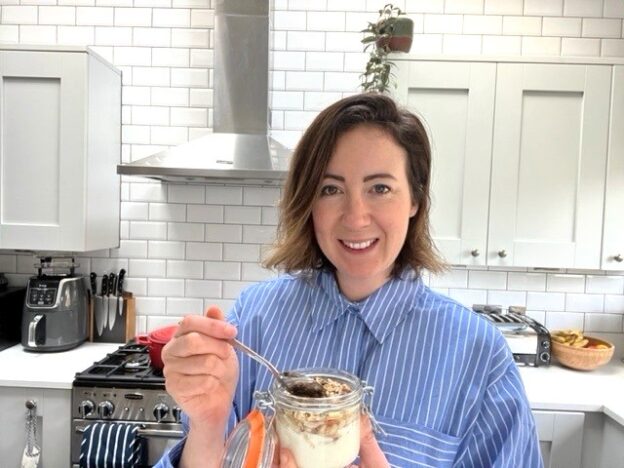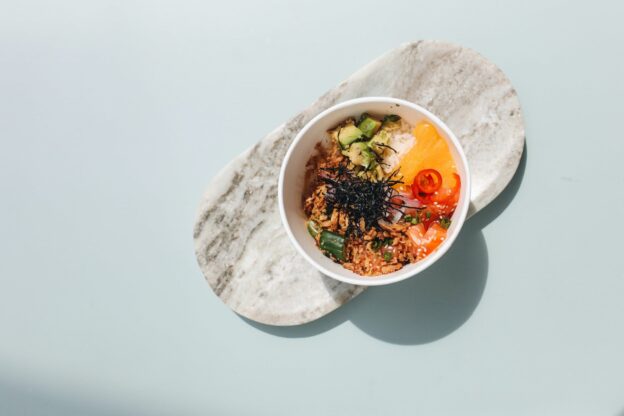Meet Alexa Mullane, a nutritional therapist with a wealth of experience dealing with hormonal health and gut issues. We sat down to discuss the benefits of a healthy diet, wellness and eating with intention.
What role does a well-balanced diet play in promoting overall health and vitality as we age?
A well-balanced diet is one of the most important things (but not the only thing!) you can do for overall health and vitality. Every cell in our body needs nutrients to function, and without essential nutrients in our diet, our health would be affected, and the aging process would be sped up. Nutrition can be used to help heal us and to prevent illnesses. Other things we can do to promote health and vitality are stay active, get out in nature, keep our brains active and maintain healthy personal relationships.
Having said that, are there certain superfoods or nutritional powerhouses you recommend for those of us looking to prioritise our health?
It’s important to get a wide range of nutrients from a variety of sources to ensure we have optimal health – and we shouldn’t focus on one food or nutrient to the detriment of others; if we ate the same foods every day then this would limit our nutrient status. A good way to ensure we get a wide range of nutrients in our diet is to eat a rainbow of fruits and vegetables, ensure we eat a range of pulses, grains, nuts and seeds, and make sure we don’t miss out any food groups – restricting foods can lead to nutrient deficiencies. Having said that, a few foods are cheap to buy and can easily be incorporated into meals – brassicas like broccoli are full of nutrients like vitamin C and help the liver detoxify hormones. Garlic is an incredible food which has antioxidant, antibacterial and antiviral properties. And turmeric is a potent anti-inflammatory food, we should be looking to include these foods in our diets most days.
Can you share insights into the role of protein in maintaining muscle mass and strength throughout the years – and how it contributes to our overall wellbeing?
Protein has many functions in the body. It’s a vital component of muscle and bone which means that as we age we need to ensure we consume good levels of protein to maintain strength and stability. Not only that but protein is also used to make some hormones (like insulin, cortisol, oxytocin and follicle-stimulating hormone), it is the building block of all enzymes in our body (which we couldn’t live without – they enable processes like liver detoxification or converting vitamin D into its useable form). Protein also contributes to immunity and is a source of energy – the list goes on. So you can see why it’s important for us to get enough protein in our diets from a variety of sources (I prefer a mixture of both plant and animal sources).
What advice do you have for someone looking to balance protein intake with other dietary requirements, especially if they have specific health concerns or conditions?
The rule of thumb I use is to have a portion of protein with every meal which is roughly the size of the palm of your hand, or a quarter of the dinner plate. This ensures you get a steady intake of protein throughout the day. If you have specific health concerns or extra protein requirements, or if you sometimes need a super quick snack or post-workout boost, then a protein supplement like the elénzia PROTEIN™ is a great idea to have in the cupboard to ensure you always hit your protein target.
How does the concept of mindful eating tie into healthy aging, and what are some practical steps for incorporating mindful eating habits into daily life?
Eating mindfully is great for digestion. If we practice mindful eating we will chew more, we will be relaxed while eating and we are less likely to overeat. All of this means that our food will be better digested and better absorbed (because the digestive juices and peristalsis will be doing an efficient job) – meaning that we will get more nutrients into our system to nourish our cells and support healthy aging. Mindful eating also means that we will be more aware of what we are putting into our bodies and will be more likely to make healthy choices and less likely to grab junk food on the go. My main advice for mindful eating is to sit down while eating (no eating a sandwich while running to your next meeting!) and have no other distractions – no phone and no TV. Eat slowly, chew each mouthful 30 times, and visualise how much your delicious food is nourishing your body. Think about the texture, temperature and flavour and you’ll appreciate food in ways you never have before.
As we strive for wellness in our later years, what’s the most rewarding nutritional change you’ve witnessed making a difference in individuals’ lives?
I believe it’s not about making one big sweeping change but instead about understanding the individual and making small, incremental changes which will improve their overall wellbeing. For me and my clients, there is no ‘one size fits all’ change. If someone loves their coffee or glass of red with dinner then I’m not going to take that away from them. I will give them small swaps or help them cut down if necessary so that they feel like good health is achievable. I will work with them over time to slowly introduce new habits and slowly phase out any bad habits. Good health and nutrition is for life and I want people to enjoy their food so that the good habits last a lifetime.



